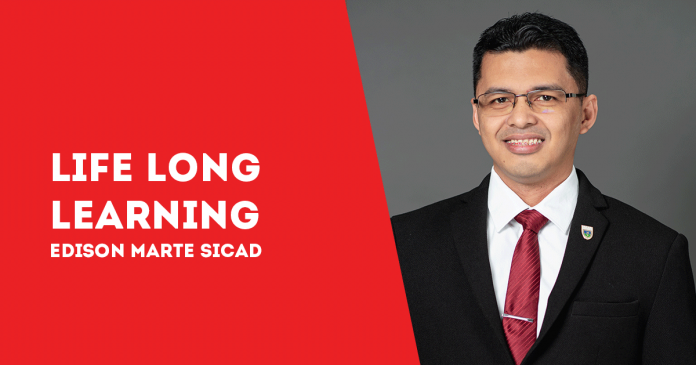
BY EDISON MARTE SICAD
“There are seven blunders that human society commits and cause all the violence: wealth without work, pleasure without conscience, knowledge without character, commerce without morality, science without humanity, worship without sacrifice, and politics without principles.” – Mahatma Ghandi
I HAVE been working as a court legal researcher for almost two years. I’ve had observed and took down notes of the progress of cases. I have learned a lot from the arguments and demeanors of the lawyers and the contending parties. So far, so good. These are the lessons I have learned or realized for the past two years:
1. Time is money.
The submission of court pleadings and motions within the reglementary period eventually defines the character of the lawyer. And I am impressed and inspired by such diligence.
In promptly accomplishing what is required and to sometimes do more than what is expected are two (2) very important lessons I witness and learn every day.
Time can indeed be a money-making element. If a person is able to do things effectively and efficiently, such discipline can actually become a financial leverage. Punctuality can build a reputation worthy of respect and trust.
In a personal way, I have also learned how to manage my budget, to know the difference between stinginess and frugality. Since money can amplify a person’s habits, I need to develop good money habits that can lead not only into more savings, but also into more income generating activities.
2. Punctuation marks.
As a court legal researcher, I need to read everything, and to read again and again important and crucial documents. I am training myself to develop the ability to separate the relevant and material from those that are without merit. I also need to develop the skill of being calm under pressure, e.g., to read fast with adequate comprehension necessary to answer a legal question at hand.
3. Character matters.
Work ethic means patience, understanding, and personal accountability. It is the willingness to improve despite any setback. And to not use other people’s bad behavior as an excuse for one’s indiscretions.
Daily work
Daily work somehow doesn’t inspire a person towards excellence. There are those who focus on retirement benefits. Some are satiated by the daily dose of office politics. Very seldom will employees take determined efforts and initiatives to improve work performance. I am guilty of this. I sometimes find myself doing “busy work”.
But regardless as to how others behave or treat their work, I have a choice: to either remain adrift or pursue excellence. Excellence would even be frowned upon when your improvement becomes an insult to those who are doing so-so.
In a sense, we all have the choice, the opportunity, and the ability, to build a reputation at work that is beyond reproach. It doesn’t have to be a world-changing mission. Small daily improvement can actually lead to a commendable and exemplary reputation. Brick by brick, you can build an empire worthy of your name. Research literature call this conscious small improvement as the 1% Principle.
What is the 1% Principle?
“The 1% improvement principle is a strategy for personal and professional development that involves making small, consistent changes to your daily habits. The idea is that these small improvements can add up to significant changes over time.”
“The 1% improvement principle is also known as the principle of “aggregate marginal gains”. It’s based on the idea that you can break down something and improve it by 1% at a time, and then see a significant increase when you put all the improvements together.”
Daily improvement is man’s ability to conquer time. As the day passes by, a man—or woman—who seeks continuous personal improvement get to optimize his time to his advantage. In a sense, this 1% Principle is a revolutionary as well as an evolutionary lifestyle.
As a court employee
I am constantly reminded how valuable my work is. Fundamentally, work is imbued with public accountability. And I have learned that my personal problems or shortcomings are not valid excuses to be mediocre at work. But building a good work ethic is a very difficult lesson to apply in a daily basis, especially when paper works never cease to pile up and deadlines, demands, and the world seem to conspire to stress you till kingdom come.
The Supreme Court, in the case of Abanil v. Ramos, Jr. (399 Phil. 572, 577 [2000]) held:
“The Court cannot simply turn a blind eye to what is clearly a conduct which tends to derogate the trust reposed in government officials, who are expected to uphold the highest degree of standards of efficiency in the exercise of their functions. As a court employee, respondent is bound to know that the conduct required of court personnel must be beyond reproach and must always be free from suspicion that may taint the Judiciary.”/PN







